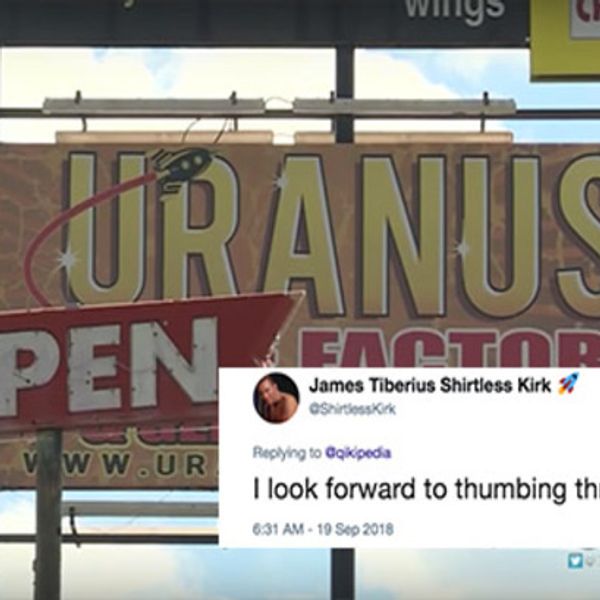April, 2004, TOKYO - I have appeared at Star Trek conventions throughout the world - in Europe, Latin America, and, of course, all over North America - except for the one obvious place for me. I had never done a Star Trek convention in Japan. I speak Japanese. I visit Japan frequently. I even attended summer school in Tokyo in my youth. Most relevantly, I am an American proud of my Japanese ancestry. Yet, I have never been invited to appear at a Star Trek convention in Japan - until I got a call last year from an entrepreneur/Star Trek fan named Kyouichi Iwahori.
 Iwahori-san flew into Los Angeles for a lunch meeting to share with me his plans to open a shop for collectors of sci-fi movie props in Tokyo and to produce the very first Star Trek convention ever held in Japan. He is a man of grand visions. And, I learned, he is a man who achieves his dreams. His business credentials were evident, and, as I spoke with him, I quickly sensed that he was a genuinely knowledgeable Star Trek fan as well. He knew each episode of the show, line for line, action for action. He even owned a yacht that he had named Star Trek.
Iwahori-san flew into Los Angeles for a lunch meeting to share with me his plans to open a shop for collectors of sci-fi movie props in Tokyo and to produce the very first Star Trek convention ever held in Japan. He is a man of grand visions. And, I learned, he is a man who achieves his dreams. His business credentials were evident, and, as I spoke with him, I quickly sensed that he was a genuinely knowledgeable Star Trek fan as well. He knew each episode of the show, line for line, action for action. He even owned a yacht that he had named Star Trek.
I flew into Narita International Airport to be greeted by Iwahori-san and his team of crack professionals. On our way to the hotel, I was informed that there would be a delay in the opening of his Hollywood Prop Shop due to some construction problems but that there would instead be a gala pre-opening party across the street from the shop. That was fine with me.
The convention was to be held in the town of Toyama, where Iwahori-san controls the Civic Auditorium. We were to stay at a hot springs spa resort overnight in that town. That sounded fabulous. This would be a wonderful visit to Japan.
 Toyama is on the Japan Sea side of Japan less than an hour flight northwest of Tokyo. It is fabled for its superb seafood as well as its natural mineral springs. That night we dined at an enchanting rustic inn sampling the many exotic delicacies unique to the area. Where else can one savor the subtle flavors of a "fire fly squid," a squid caught only at night by the glow that it sends out, or a fat, bug-eyed fish as delicious as it is ugly. The spa resort was reached after a winding night drive up to the top of a rugged mountain. I was exhausted after my travels. Changing into a "yukata," or cotton sleeping kimono, I went straight to bed.
Toyama is on the Japan Sea side of Japan less than an hour flight northwest of Tokyo. It is fabled for its superb seafood as well as its natural mineral springs. That night we dined at an enchanting rustic inn sampling the many exotic delicacies unique to the area. Where else can one savor the subtle flavors of a "fire fly squid," a squid caught only at night by the glow that it sends out, or a fat, bug-eyed fish as delicious as it is ugly. The spa resort was reached after a winding night drive up to the top of a rugged mountain. I was exhausted after my travels. Changing into a "yukata," or cotton sleeping kimono, I went straight to bed.
There can be no more glorious way to greet the new day than a morning soak in a steaming outdoor mineral spring. Gazing out at rugged, ancient rock outcroppings and gnarled old pine trees with the town of Toyama off in the distance below was the most relaxing way to prepare for a full day of a Star Trek convention.
The elements that make up a Star Trek convention are the same the world over - the autographs, the talk, and the promotional visits to the local radio stations and newspaper offices. There are, however, cultural distinctions with each one. For this Star Trek convention in Japan, I dressed in my suit and tie. The talk was formally organized. Iwahori-san conducted an interview/conversation with me on stage which was projected on a giant video screen behind us to accommodate the audience in the vast auditorium. At the end of our conversation a cute young fan came onstage and presented me with a gorgeous bouquet of flowers bigger than he was. There was much bowing up and down. Backstage, he gave me a sketch of the Starship Enterprise that he had drawn himself. The autograph line was well planned and orderly and the fans were politely enthusiastic. This was distinctively a Japanese Star Trek convention - as punctual and efficient as their fabled bullet train operation. This is one convention that will remain in my memory. I will have to share my experience of this convention with my colleagues from the show. I know they will want to do one here too - but they'll have to start brushing up their Japanese.
 We flew back to Tokyo that evening. As we drove into the great metropolis from the airport, I was dazzled by the soaring new office towers that had gone up in formerly low rise districts of the city. Shinagawa was now a shining new city of corporate headquarters. Roppongi, a lively entertainment district now had a new mega-complex of luxury hotels, apartments, international shopping, an art museum and a towering centerpiece high rise tower visible from anywhere in Tokyo. The economic vitality of this city never fails to impress me.
We flew back to Tokyo that evening. As we drove into the great metropolis from the airport, I was dazzled by the soaring new office towers that had gone up in formerly low rise districts of the city. Shinagawa was now a shining new city of corporate headquarters. Roppongi, a lively entertainment district now had a new mega-complex of luxury hotels, apartments, international shopping, an art museum and a towering centerpiece high rise tower visible from anywhere in Tokyo. The economic vitality of this city never fails to impress me.
Iwahori-san's collector store, The Hollywood Prop Shop, was almost ready to open - but not quite. The display shelves and counters were not yet in. Some of the merchandise had not yet arrived. There was the hustle and bustle of staff in hectic preparation. After a quick inspection of the premises, I quickly got out of their way. The shop was well located - right in the busy Nishi Roppongi district. It should do well. If the gala pre-opening party was any indicator, the venture should be a smash success. Star Trek fans I had met on previous visits to Japan were there to greet me as an old friend. Stars of Japanese action movies were mingling with wealthy collectors. The buffet table was laden with delectable Chinese food. The speeches were generously congratulatory. The evening was a happy launching of an enterprise boldly going where Star Trek had not ever gone before - to the very heart of sci-fi collectors' Tokyo.
 Iwahori-san topped off the trip with a final unforgettable experience. It was a visit to the futuristic National Museum of Emerging Science and Innovation. The museum showcases a vision of humankind's future of exploration, balanced with care for the environment; of experimental daring tempered by awareness of its consequences. Going through the exhibits was, at once, inspiring and challenging.
Iwahori-san topped off the trip with a final unforgettable experience. It was a visit to the futuristic National Museum of Emerging Science and Innovation. The museum showcases a vision of humankind's future of exploration, balanced with care for the environment; of experimental daring tempered by awareness of its consequences. Going through the exhibits was, at once, inspiring and challenging.
The Director and Chief Executive Officer of the institution was no less than a man who had himself been out in space, Japan's astronaut, Mamoru Mohri. I had met him on a visit to Okinawa in November 2000. My great luck on this call was that it happened to coincide with the visit of another space scientist, the woman astronaut from Japan, Chiaki Mukai. It would have been a rare treat just to visit an astronaut but to meet two astronauts - both from Japan - was an unexpected stroke of good fortune. Director Mohri amusingly observed that he considered me his "senior" because he saw me out in the galaxy years before he ever got out in space to the International Space Station. I demurred. I stated that Astronaut Mohri is a 20th century spaceman and I, as Sulu, played a 23rd century star trekker, so, in fact, he is three hundred years my "senior" - and my inspiration as well.
 Life moves in fascinating ways. We were brought together in this museum of the future by the vision and genius of Gene Roddenberry who gave birth to "Star Trek." His creation merged time and space and still continues to have an effect. A student in Japan saw an actor portraying a spaceman of the future on television some years back. Today, he, as a genuine astronaut, and that actor share a convivial visit - 21st century fact and 20th century vision, meeting at a museum of the future in Tokyo, Japan. The power of human imagination makes wondrous things happen. Domo arigato Iwahori-san for your fantastic hospitality and my very best wishes for the success of your enterprise.
Life moves in fascinating ways. We were brought together in this museum of the future by the vision and genius of Gene Roddenberry who gave birth to "Star Trek." His creation merged time and space and still continues to have an effect. A student in Japan saw an actor portraying a spaceman of the future on television some years back. Today, he, as a genuine astronaut, and that actor share a convivial visit - 21st century fact and 20th century vision, meeting at a museum of the future in Tokyo, Japan. The power of human imagination makes wondrous things happen. Domo arigato Iwahori-san for your fantastic hospitality and my very best wishes for the success of your enterprise.
This Brand's Tweet History Is A Hilariously Fitting Representation Of A Brand's Life Cycle 😂
Carl's Croutons tried their hand at social media to advance their brand.
But their objective got derailed when their tweet ignited a confusing thread that sent everyone down the rabbit hole.
@topherflorence captured highlights from the thread that received over three thousand retweets for its zaniness alone.
Can you follow?
the history of every brand on twitter somehow https://t.co/fWVXsElCvr— D🌑CFUTURE (@D🌑CFUTURE) 1540403954.0
The bread crumbs company endeavored to stir excitement for the brand by encouraging participation with the following tweet:
"Taking our first steps on the www!! tell us your favorite crouton recipes! #croutons #yum"
Harmless, right?

But somewhere along the way, the brand mixed business with politics. @religiousgames noticed that Carl's Croutons issued a one-word directive: vote.
The Twitter user asked, "What does it mean?"
@topherflorence What does it mean? https://t.co/IKifvva7ba— Vincent Gonzalez (@Vincent Gonzalez) 1540408943.0
Did the Carl's Croutons account manager get his social media account wires crossed? Possibly. But then we're not sure.
@topherflorence responded by saying, "lol that wasn't me i would posted something way dumber."
@religiousgames lol that wasn't me i woulda posted something way dumber— D🌑CFUTURE (@D🌑CFUTURE) 1540409220.0
The following tweet from Carl's Croutons attempted damage control:
"Carl's Crutons [sic] regrets the inappropriate tweet from earlier and we sincerely apologize to the people of The Republic of Malta."

So how did Carl's Croutons insult the Republic of Malta?
@topherflorence @oggborbis ...how did they insult Malta? I need to know.— astronaatti (@astronaatti) 1540405285.0
@Bestorb shed some light on why the Southern European island country may have been insulted by sharing a YouTube clip of episode 1008, "Final Justice," from Mystery Science Theater 3000.
Did it have something to do with the country's dominant population of women?
@astronaatti @topherflorence @oggborbis https://t.co/9imm31y8cM— Nick Bestor (@Nick Bestor) 1540429565.0
The thread spun off in all different directions.

@topherflorence @xoxogossipgita laughing hardest at crouton recipes— super normal internet (@super normal internet) 1540492558.0

@topherflorence That last one is life 🙌🏽— Rich F. Santiago (@Rich F. Santiago) 1540418084.0
@topherflorence WOW this was a ride.— Jackal's Husband, Yuko (@Jackal's Husband, Yuko) 1540405005.0
@ItsBobberto @topherflorence @austin_walker Late stage social media.— Mr. Jackpots (@Mr. Jackpots) 1540435914.0
There were many takeaways from the esoteric thread, but the one directive really stood out.
@topherflorence @MaxKriegerVG Haha, you got me. But seriously, vote.— Benoit Doidic (@Benoit Doidic) 1540414697.0
@topherflorence @zoebread Clever girl. https://t.co/i5VB74s8F9— brott rambler but spooky (@brott rambler but spooky) 1540478919.0
@topherflorence @NoraReed This was a wild ride.— Queer Eye for the Animorphs Reboot (@Queer Eye for the Animorphs Reboot) 1540412903.0
@topherflorence @seangentille I’m experiencing a new level of cringe right now— Helle Hansen 🌸 (@Helle Hansen 🌸) 1540423182.0
@topherflorence @ZaaackKoootzer This is the greatest thing I've seen all day— your very own monica bellucci dream (@your very own monica bellucci dream) 1540406700.0
@topherflorence @spacetwinks Optimistic engagement. Regret. 'How do you do, fellow kids.' Unity through shared outr… https://t.co/6VGrLNPZVp— Ink-stained @ MFF 2018 (@Ink-stained @ MFF 2018) 1540405582.0
@topherflorence @spacetwinks 2 is where they decided to hire a social media manager. 3 is when they decided to hire a different one.— Ink-stained @ MFF 2018 (@Ink-stained @ MFF 2018) 1540412100.0
@LaserBlade @topherflorence yeah i actually think they're pretty good croutons but then again they pay me to say that— cool dog mowing lawn (@cool dog mowing lawn) 1540436982.0
@topherflorence @mattfx This is magically funny like Goofy doing an unannounced set in a small black room— M💎R (@M💎R) 1540482697.0
@topherflorence @ZaaackKoootzer This is the greatest thing I've seen all day— your very own monica bellucci dream (@your very own monica bellucci dream) 1540406700.0
There's still an unanswered question.
@topherflorence I need to know the Malta story tho— NeoSorosbot (@NeoSorosbot) 1540423045.0
So who is Carl's Croutons anyway? Nobody knows. Just vote.
Clever Dog Tricks McDonald's Customers Into Feeding Her By Pretending To Be A Stray 😂
It's a dog eat dog world out there and sometimes a girl has to do what a girl has to do. At least that's what one dog owner realized when she caught her pooch trolling the streets looking for an easy meal.
Facebook user Betsy Reyes busted her dog Princess who was out moonlighting as a stray in order to play on the sympathies of strangers. It seems Princess likes to wander off to her favorite hangout, the local McDonald's, and work the drive through lane like a pro.
And that's what she did right up until Reyes busted her scam. Reyes, who lives in Oklahoma City, took to Facebook and outed Princess in the most hysterical way, saying:
"If you see my dog @ the McDonald's on shields, quit feeding her fat ass bc she don't know how to act & be leaving the house all the time to go walking to McDonald's at night. She's not even a stray dog. She's just a gold diggin ass bitch that be acting like she's a stray so people will feel bad for her & feed her burgers."
Lots of scammers out there.
@CBSNews My lab Would jump the fence every morning as I got ready to work and when I went to leave he would reappea… https://t.co/NJhg4ZuGq1— Anneik 💛 (@Anneik 💛) 1540434345.0
@CBSNews https://t.co/UqWvClKi8z— Bruinlover- follower of Nakia (@Bruinlover- follower of Nakia) 1540418292.0
@CBSNews I TOOK MINE TO THE DRUGSTORE AND WHILE I WAS PAYING HE STOLE A CANDY BAR, WALKED RIGHT OUT THE DOOR WI… https://t.co/U3DlWunzcK— PUEBLO294 (@PUEBLO294) 1540415919.0
@LCaro294 @CBSNews Mine stole a butterdish at my mum’s house, ate all the butter then buried the butterdish to hide the evidence.— Tricoteuse (@Tricoteuse) 1540418005.0
@CBSNews My dog would 100% do this if she could get out of the house. On our walks she stands in the doorways of fo… https://t.co/33ovz44HUX— Skulls&Bacon (@Skulls&Bacon) 1540420511.0
@BillichThomas @skullsandbacon @CBSNews 100% would hand over my bagel, if only because she looks so annoyed with me… https://t.co/aQs5qKhETN— Claire Pettie (@Claire Pettie) 1540434235.0
It's an adorable story, but maybe get the dog a collar with identification?
@CBSNews Pretends? Leaves the collar stashed around the corner, or what?— Jim Snell (@Jim Snell) 1540429214.0
@CBSNews This is adorable but this dog should 100% be wearing a collar and also get microchipped! Love this story :)— Minka “ACAB” Eisenhower (@Minka “ACAB” Eisenhower) 1540418766.0
Not everyone thought the story was cute.
@CBSNews Great way to keep your dog safe. 🙄— 🧚🏻♂️ Free Hugs 🌊 🇺🇸🇳🇴🇫🇮☮️⚛️ Ⓥ🌱😷 (@🧚🏻♂️ Free Hugs 🌊 🇺🇸🇳🇴🇫🇮☮️⚛️ Ⓥ🌱😷) 1540414161.0
@CBSNews Unless you can keep your dog safe at home and not out in traffic where she could be hit by a car, stolen,… https://t.co/6BMPMLYgYs— Lindsey McBride (@Lindsey McBride) 1540435397.0
Of course, when a girl's gotta eat, a girl's gotta eat.
@chabsmescudi Funny.... but time to build a super gate. https://t.co/NZBE1s3lm6— OEL𝕊𝕂𝕐 (@OEL𝕊𝕂𝕐) 1540238320.0
@chabsmescudi The dog: https://t.co/FSmeFYhspT— Angie (@Angie) 1540231585.0
@BetsysReyes @chabsmescudi Your dog every night after standing on the road https://t.co/mrTCMOtOVA— N.A.S.A (@N.A.S.A) 1540235406.0
@chabsmescudi I would have been mad if my dog didn’t bring anything back. https://t.co/qb7ED7cwMG— Name Change (@Name Change) 1540325221.0
Let's hope Princess has learned her lesson and stays home.
H/T: Huffington Post, Mashable
Scotland Tackles Transphobia and Homophobia In Brilliant New Billboard Ads ❤️
The Scottish government has had enough of hate crimes and is moving forward with a gutsy campaign.
According to Pink News, Scotland is launching a new initiative to combat intolerance with messages respectively addressing "bigots," "disablists," "homophobes," "racists," and "transphobes" in a series of ads circulating across the country.
Each message is signed on behalf of Scotland.
The campaign is part of the Scottish government's One Scotland project in an effort to reduce hate crime.
"The provocative ads were produced by the Scottish Government and Police Scotland as part of the One Scotland campa… https://t.co/KjinQL9xXT— Lizanne Foster (@Lizanne Foster) 1537935300.0
One letter reads:
"Dear transphobes, do you think it's right to harass people in the street? Right to push transgender people around in clubs? Right to humiliate, intimidate and threaten them online? Well we don't."
"That's why if we see you doing harm, we're reporting you. We believe people should be allowed to be themselves. Except if they're spreading hate."
"Yours, Scotland."
In another letter, the country says it has a "phobia" of homophobic behavior.
"If you torment people because of who they love, shout word that we are not going to write, or use violence because you don't like who someone is holding hands with, you should be worried."
"If we see or hear your abuse, we're calling the police. That's because love lives in this country, not hate."
"Yours, Scotland."
One Scotland's website describes the organization as one that aims to continue building an inclusive society while recognizing the significant strides made so far towards equality.
"One Scotland embodies the inclusive society we want in Scotland, where equality and human rights are respected and every individual and minority group feels valued."
There is a new ad campaign against hate crimes in Scotland. “We are a caring nation, not a hating one”.… https://t.co/rfsiFjIq6V— Jen Yang Mezei (@Jen Yang Mezei) 1537975493.0
The website defines hate crimes as abuse that "can be verbal or physical and has hugely damaging effects on the victims, their families and communities, and we all must play our part to challenge it."
"Police Scotland takes hate crime very seriously. In the last year there were over 5,300 charges of hate crime reported to the Procurator Fiscal in Scotland1."
"However, there are many more incidents that go unreported. We all have a responsibility to report hate crime if we witness it – it's the only way we can challenge it, and put an end to it for good."
The fact that the Scottish government and police are behind this ad campaign is incredible. It's good to see at lea… https://t.co/zMrqDVrhed— TransgenderDate (@TransgenderDate) 1537900917.0
Justice minister Humza Yousaf is familiar with being a victim of a bigotry and is encouraging people to call out and report any incidents involving harassment.
"As somebody who has faced Islamaphobic and racial abuse over the years, I know how upsetting being a victim of hate can be. Hate crime and prejudice are completely unacceptable and we are absolutely committed to tackling it."
"We all have a role to play in stamping out prejudice and I would ask anyone who witnesses a hate crime to play their part and report it. Justice agencies such the police and Crown Office will deal sensitively with reports made and people should have confidence in how they will be treated. Last year there were over 5,300 charges of hate crime reported to the Procurator Fiscal in Scotland but there are still many incidents that are going unreported."
New Ad Campaign launching on billboards and ad spaces all over #Scotland tackles #hatecime. The Police Scotland a… https://t.co/VJFH0jprjP— Pinksixty (@Pinksixty) 1537896702.0
Henrietta Mochrie identifies as transgender and has been the victim of repeated harassment and abuse. She emphasized the importance of speaking out against the hatred.
"I'll often get street harassment, sometimes this has escalated to the point where I've been followed by people shouting abuse at me, just because of who I am."
"It makes me feel really down and scared to leave the house. It's important that if you witness hate crime that you report it to take a stand against hate."
One Scotland's ad campaign officially launched on Wednesday.
Hopefully, it won't take too long before other nations follow suit in this bold, yet necessary fight for equality.
H/T - OneScotland, PinkNews, Twitter
Woman Was Fired For Refusing To Wear A Bra At Work—And Now She's Suing
Christina Schell, from Alberta, Canada, stopped wearing bras three years ago citing health reasons.
While Schell did not specify the health reasons, she did state she finds them to be "horrible."
But after her refusal to sign or adhere to a new enforced dress code policy to wear a bra or tank top under her work shirt at a golf course grill where she worked, Schell was promptly fired.
Now, the 25-year-old has filed a human rights violation against the Osoyoos Golf Club, Osoyoos, in British Columbia, Canada.
Schell said:
"I don't think any other human being should be able to dictate another person's undergarments."
When she asked the general manager, Doug Robb, why she had to comply, the manager told her the mandate was for her protection.
Robb allegedly said:
"I know what happens in golf clubs when alcohol's involved."
After losing her job, she brought the case to the British Columbia Human Rights Tribunal and told them the club's dress code was discriminatory because the rule didn't apply towards male employees.
Schell told CBC:
"It's gender-based and that's why it's a human rights issue. I have nipples and so do the men."
David Brown, an employment lawyer in Kelowna, BC, said gender-specific dress codes could be viewed as discriminatory under the BC Human Rights Code.
He stated:
"It's an interesting question as to whether or not an employer can dictate the underwear that women can wear, but they don't say anything about the underwear that men can wear, and does that create an adverse impact on the individual?"
Brown added:
"If this policy is found to be discrimination, the next question is does the employer have a bonafide occupational requirement to essentially impose this on the individual?"
"I'm kind of scratching my head as to what that occupational requirement would be."
@GlobalBC The policy is sexist the peopl supporting it are sexist. Hope she wins her complaint— Lori bell (@Lori bell) 1529692660.0
@Shelby_Thom @WoodfordCHNL @GlobalOkanagan @GlobalBC Then men should have to wear either a tank top or undershirt— caffene fiend (@caffene fiend) 1529624161.0
@SoldByBrock @Shelby_Thom @GlobalOkanagan @GlobalBC What does common courtesy have to do with wearing a bra? Breast… https://t.co/ZVI2xDdpgf— M Shumway (@M Shumway) 1529843759.0
As for the tank top option, due to working under oftentimes extreme heat serving tables outsides, Schell did not want to wear another layer of clothes just because of her gender.
Schell said:
"It was absurd. Why do you get to dictate what's underneath my clothes?"
Employment lawyer Nadia Zaman told CBC that the club can enforce a gender-specific policy as they deem necessary as long as the establishment can prove it is for the occupational safety of its workers.
But the attorney questioned if forcing female employees to wear a bra was applicable in this case.
Zaman stated:
"If they simply require that female employees wear a bra but then they don't have a similar requirement for males, and they can't really justify that … then there is a risk that their policy's going to be deemed to be discriminatory."
Under British Columbia's discrimination law, it is illegal for employers:
'to discriminate against any individual because of his race, color, religion, sex, or national origin'.
@GlobalBC @globalnews Logistically bras or the absence of does not impact health or work performance. That is my v… https://t.co/65cLHBMowf— Louisette Lanteigne (@Louisette Lanteigne) 1529769211.0
McDonald's employee Kate Gosek, 19, agrees with Schell in that the dress code is "unnecessary." She too was harassed by her employers at a McDonald's in Selkirk, Manitoba, over refusing to wear a bra.
"She just told me that I should put on a bra because, McDonald's—we are a polite restaurant and no one needs to see that."
Schell's case sparked plenty of debates on Twitter.
@DunnMan77 @GlobalBC It's just discriminatory, woman shouldn't have to wear bras if they don't want to. As well as… https://t.co/RXhRVWUuNy— Mary Johnson (@Mary Johnson) 1529685276.0
@DunnMan77 @GlobalBC Men do not have to wear underpants if they don't want to. As of right now there are no laws to… https://t.co/l8FuPVybWo— Mary Johnson (@Mary Johnson) 1529686418.0
@GlobalBC Women have the right not to be forced to wear a bra Shaving & makeup also is a choice. If you want to do… https://t.co/Ybkj6PLDnD— Lozan (@Lozan) 1529686156.0
@Lozan72 @GlobalBC I would completely understand her and your argument if we were talking about a potential law to… https://t.co/trRyNAubn4— Chris George (@Chris George) 1529690293.0
@GlobalBC This story frustrates me. There's no dress code equivalent for men? Well if I saw the outline of a male s… https://t.co/5YbAvXKRcO— Molly Max (@Molly Max) 1529705327.0
Schell is not alone in her disdain for bras.
@GlobalBC I personally HATE wearing a #bra absolutely hate it with passion and unashamed to admit it. I HATE BEING… https://t.co/GEi3LtxIDa— Lozan (@Lozan) 1529686305.0
Schell is still waiting to hear from the Human Rights Commission about her claim.
H/T - GettyImages, Twitter, Indy100, CBC















 (
( (
(